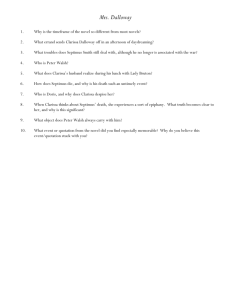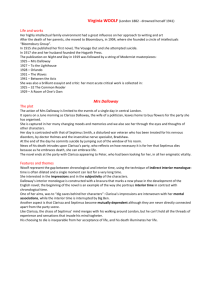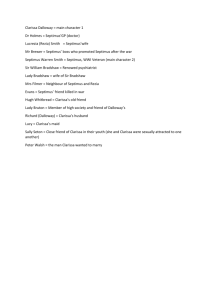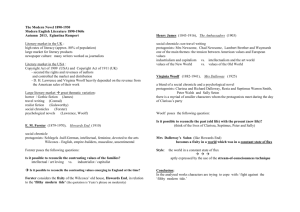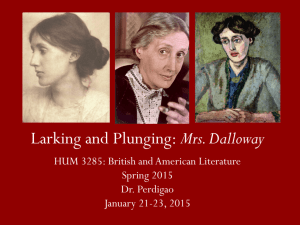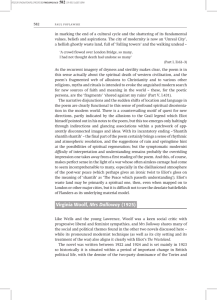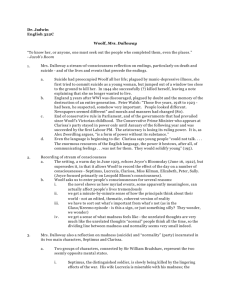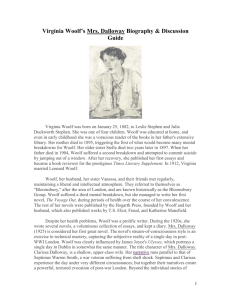bjmcdermott
advertisement
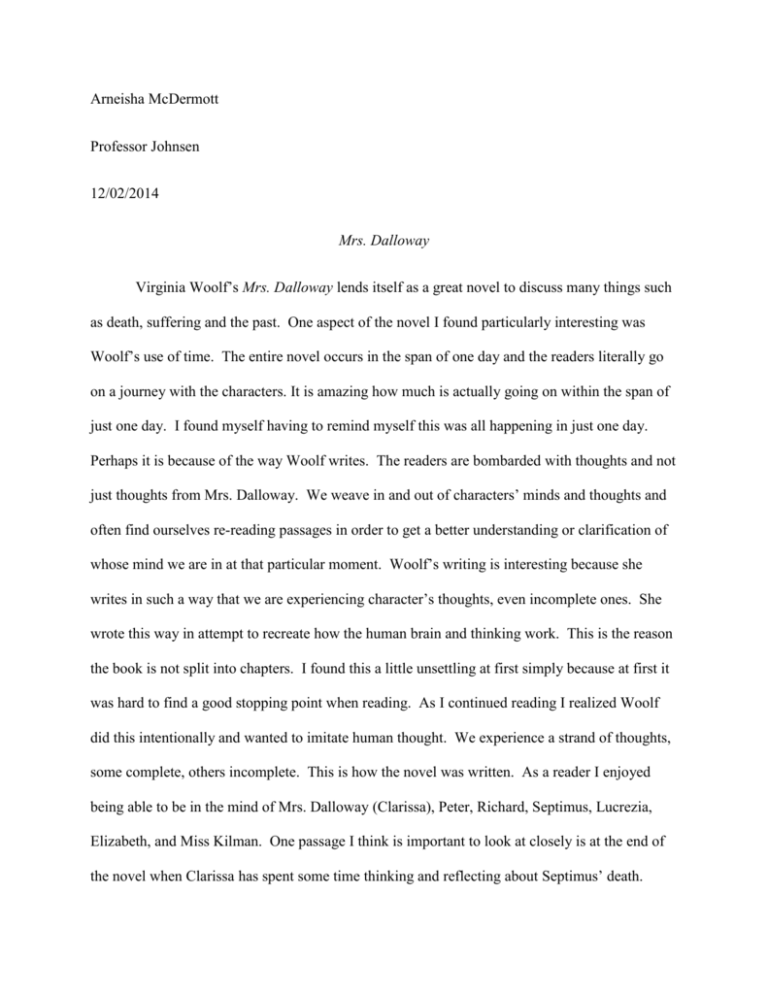
Arneisha McDermott Professor Johnsen 12/02/2014 Mrs. Dalloway Virginia Woolf’s Mrs. Dalloway lends itself as a great novel to discuss many things such as death, suffering and the past. One aspect of the novel I found particularly interesting was Woolf’s use of time. The entire novel occurs in the span of one day and the readers literally go on a journey with the characters. It is amazing how much is actually going on within the span of just one day. I found myself having to remind myself this was all happening in just one day. Perhaps it is because of the way Woolf writes. The readers are bombarded with thoughts and not just thoughts from Mrs. Dalloway. We weave in and out of characters’ minds and thoughts and often find ourselves re-reading passages in order to get a better understanding or clarification of whose mind we are in at that particular moment. Woolf’s writing is interesting because she writes in such a way that we are experiencing character’s thoughts, even incomplete ones. She wrote this way in attempt to recreate how the human brain and thinking work. This is the reason the book is not split into chapters. I found this a little unsettling at first simply because at first it was hard to find a good stopping point when reading. As I continued reading I realized Woolf did this intentionally and wanted to imitate human thought. We experience a strand of thoughts, some complete, others incomplete. This is how the novel was written. As a reader I enjoyed being able to be in the mind of Mrs. Dalloway (Clarissa), Peter, Richard, Septimus, Lucrezia, Elizabeth, and Miss Kilman. One passage I think is important to look at closely is at the end of the novel when Clarissa has spent some time thinking and reflecting about Septimus’ death. “She felt somehow very like him—the young man who had killed himself. She felt glad that he had done it; thrown it away. The clock was striking. The leaden circles dissolved in the air. He made her feel the beauty; made her feel the fun. But she must go back. She must assemble”. This passage occurs at the end of the novel when Clarissa is at her party and hears the news from Lady Bradshaw that Septimus committed suicide. This passage is the point in the novel when Clarissa and Septimus are finally connected. Throughout the novel the readers start to pick up on their similarities but the two characters do not even know each other. They both quote Shakespeare throughout the novel and their thoughts are very similar. Clarissa struggles throughout the novel (the day) pondering death and has a fear of it. In this passage she finally comes to terms with death but it is through Septimus. She even says that “death is an attempt to communicate”. As I read, my mind lingered on that quote for a while. She doesn’t say death is communication but an attempt. Septimus’ death certainly serves as a form of communication or an epiphany for her. It seems as though death is symbolized as freedom, at least for Septimus. He was miserable and was making his wife miserable as well and was not getting better. It is in the final part of the novel that she comes to terms with death and realizes that Septimus’ death shows her how beautiful and precious her life is. At first she was angry that Lady Bradshaw mentions such a thing at her party. Once again Clarissa thinks and reflects and eventually seems to be quite pleased by news. She admits that he is brave for being able to take his own life because she could not have done that, and realizes that his death makes her want to appreciate her life more. I think that Woolf begins that novel in an interesting way that relates to appreciating life. Clarissa is going to the store to buy flowers when her day and the story begin. The following passage comes from the beginning of the novel: “There were flowers: delphiniums, sweet peas, bunches of lilac; and carnations, masses of carnations. There were roses; there were irises. Ah yes — so she breathed in the earthy garden sweet smell as she stood talking to Miss Pym who owed her help, and thought her kind, for kind she had been years ago; very kind, but she looked older, this year, turning her head from side to side among the irises and roses and nodding tufts of lilac with her eyes half closed, snuffing in, after the street uproar, the delicious scent, the exquisite coolness”. This passage illustrates that fragmented, thought like speech I previously mentioned that Woolf uses throughout the novel. Woolf uses many semicolons to symbolize “train of thoughts” and incomplete thoughts. This passage is a great example of how effective it is. The readers are on several journeys with Clarissa. We are going to the store with her as well as trying to keep up with her thoughts. “There were roses; there were irises. Ah yes-so she breathed in the earthy garden smell…” Woolf’s language is very poetic and fragmented here. Readers can picture looking to left and seeing roses, and looking to the right to see the irises and of course breathing in the “earthy garden smell”. Something else I found interesting about this passage is Woolf’s use of flowers to symbolize something greater than just garden flowers. Throughout the novel flowers appear in several contexts and they all seem to represent emotions and feelings, specifically happiness. Clarissa spends most of her day thinking about memories and the past. These memories involve flowers and were some of the happiest times of her life. Two passages that I found striking were when she talks about Sally. “Sally went out, picked hollyhocks, dahlias – all sorts of flowers that had never been seen together – cut their heads off, and made them swim on the top of water in bowls. The effect was extraordinary – coming in to dinner in the sunset. (Of course Aunt Helena thought it wicked to treat flowers like that)”. “Then came the most exquisite moment of her whole life passing a stone urn with flowers in it. Sally stopped; picked a flower; kissed her on the lips. The whole world might have turned upside down!”. Sally and Clarissa had feelings for each other but knew they could not be together. She mentions Sally often in the book and there were usually flowers involved which is interesting. I found two passages that illustrate this and the second passage shows how much Clarissa really cared about Sally. The moment Sally kissed her was described as “the most exquisite moment of her whole life”. They loved each other but could not be together because of society. They knew that society expected them to act a certain way which was to marry and follow the status quo of English society. Clarissa relives these memories of the past while she is shopping for flowers and readers get a glimpse of what her life was like before she married Richard. In a way these memories are haunting her because she begins to wonder what things would have been like had she not married Richard, but Peter Walsh. She dismisses these thoughts because she knows that things would not have been better had she married Peter. It is moments like this when I found myself appreciating Woolf’s writing. Woolf writes in a way that makes the characters feel very authentic. Everyone has had times in their lives where they ponder on the past or a certain memory they cannot seem to let go. It is interesting because the way the book is written, the view point constantly changes therefore we get several little memories from different characters. Clarissa remembers some good memories, particularly with Sally but Peter and Septimus think about bad memories. Peter’s thoughts usually include Clarissa and him trying to make sense of what happened between them. Like Septimus, his memories are a painful reminder of a hard time of his life. Septimus is a war veteran who suffers from post-traumatic stress disorder which the other characters are not aware of (not even the doctor). Dr. Holmes dismisses his condition as him being “disproportionate”. This leaves his wife and others thinking that he is just going mad. No one understands that the war has greatly affected him. He even hallucinates and begins seeing Evans (a friend of his who was killed in the war). I find Septimus’ narrative very interesting because it seems as if Woolf was before her time. I think that she had some idea of the negative effects war has on people and she had some knowledge about the post-traumatic stress that occurs, but her society did not. Septimus cannot find any relief or happiness in his life. He decides to take his own life in order to avoid oppression from the doctors. He believes everyone thinks he is just crazy and that the doctors will send him away. He wants to avoid that because in his eyes he would be oppressed and still suffering. If the doctors did take him away he would lose control over his own life. He desired to have the control back so he jumped out of the window. Ironically he took control but it did not do any good since his life ended the moment he decided to take control. Essentially, he was escaping the oppression he knew he faced and wanted to avoid having to conform to society. This feeling of oppression experienced by Septimus is another aspect of his character that connects him to Clarissa. There are moments in the book where the readers see that Clarissa feels oppressed or forced to conform. One example is when she describes being in love with Sally but not being able to be with her because “the world would turn upside down”. Society would not have allowed same sex relationships and it’s interesting because this sort of thing is still taboo in today’s society. Miss Kilman could also be seen as an oppressor in the novel trying to force religion. Perhaps this is why Clarissa despised her and did not want Elizabeth with her so often. Something I found interesting while reading, is the fact that Clarissa and Septimus were so similar but belonged to two different social classes. Clarissa was a member of the upper class while Septimus was a working class man but this difference does not allow their narratives to be extremely different. Virginia Woolf wrote Mrs. Dalloway in such a way that her use of language and time cannot be ignored when analyzing it. The ways the sentences are structured are similar to the way we actually think. At first I found it difficult to read simply because there was a lack of separation (chapters) and it was confusing to remember “whose mind” I was in. Once I slowed down and re read certain passages I really began to appreciate the style of writing. It was pleasant and even amusing at times to be able to see what particular characters think about one another; For example when Peter and Clarissa are interacting with one another. It is very interesting that so much seems to happen in just one day. The writing is very effective in that way because readers are able to get all of these different viewpoints. The readers are able to go on a journey with Clarissa and the other characters as well. There are underlying themes of death, suffering and time. One of the things I have been pondering is whether Mrs. Dalloway is content at the end of the novel. She appears happy now that she has come to terms with death. However one thing that I noticed while reading is that Mrs. Dalloway seems to think about the past a lot. She seems to relive the past and it makes me wonder if she is happy with the present. How can one enjoy the present or the future if they are constantly reliving the past?
